

The Media Line. The burst of information that has washed across the Arab world since the mid-nineties has caused dramatic changes in the media landscape.
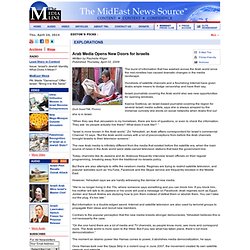
Hundreds of satellite channels and a flourishing Internet have given Arabs ample means to dodge censorship and have their say. Israeli journalists covering the Arab world also see new opportunities for opening windows. Ksenia Svetlova, an Israel-based journalist covering the region for several Israeli media outlets, says she is always amazed by the immense curiosity she elicits on social networks when Arabs find out she is in Israel. “When they see that Jerusalem is my hometown, there are tons of questions, or even to check the information. They ask ‘do people actually live there? Assad's Bizarre Instagram Account: Propaganda With a Comments Section - Megan Garber. "I belong to the Syrian people," Syrian president Bashar al-Assad told the French journalist George Malbrunot, of the newspaper Le Figaro, earlier this week.
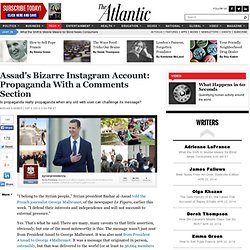
"I defend their interests and independence and will not succumb to external pressure. " Yes. That's what he said. There are many, many caveats to that little assertion, obviously, but one of the most noteworthy is this: The message wasn't just sent from President Assad to George Malbrunot. Al Jazeera Plays Galvanizing Role in Arab Protests. Twitter users in Arab world increase by 85% - Media.
The Role of Social Media in the Arab Uprisings. What the Arab Spring Tells Us About the Future of Social Media in Revolutionary Movements. Twitter in the Arab Region. Source: Arab Social Media Report: Copyright Information: Arab Social Media Report by Dubai School of Government - Governance and Innovation Program is licensed under a Creative Commons Attribution-NonCommercial-ShareAlike 3.0 Unported License.
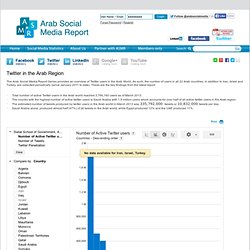
Based on a work at: www.ArabSocialMediaReport.com Permissions beyond the scope of this license may be available at: www.ArabSocialMediaReport.com. Iran president acknowledges Holocaust, talks Syria and Twitter. Part 1: Amanpour and Iran's Pres Rouhani Part 2: Amanpour and Iran's Pres Rouhani If you are viewing this on a mobile phone and cannot play the video, you can watch part 1 here and part 2 here.
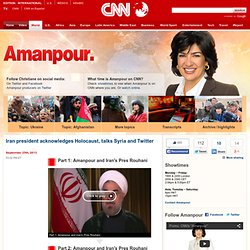
By Josh Levs and Mick Krever, CNN Iran's new president has acknowledged that Nazis killed Jews, furthering the stark contrast between himself and his predecessor, who called the Holocaust a "myth. " In a wide-ranging interview with CNN, he also discussed Israel and Syria. Social media becomes weapon in Middle East propaganda battles. The Media Line. Iran Briefly Loses Grip on Social Media. Today in international tech news: Iran loosens its grip on Facebook and Twitter (for a few hours).
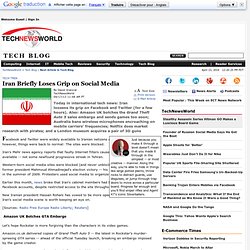
Also: Amazon UK botches the Grand Theft Auto 5 sales embargo and sends games too soon; Australia bans wireless microphones encroaching on mobile carriers' frequencies; Netflix does market research with pirates; and a London museum acquires a pair of 3D guns Facebook and Twitter were widely available to Iranian netizens on Monday. Come Tuesday, however, things were back to normal: The sites were blocked. Iran's Mehr news agency reports that faulty Internet filters caused the sites to become available -- not some newfound progressive streak in Tehran. Western-born social media sites were blocked (and never unblocked) during protests over former president Mahmoud Ahmadinejad's election victory -- his disputed election victory -- in the summer of 2009. New Iranian president Hassan Rohani has vowed to be more open than his predecessor, so Iran's social media scene is worth keeping an eye on.
Another Iranian Official Comes Out In Favor Of Facebook. Twitter in the Arab Region. How Social Media is Replacing Traditional Journalism as a News Source [Infographic] Media in the Middle East surveys find increased freedom, controls. Two new surveys show that many in the Middle East have a conflicted relationship with their media.
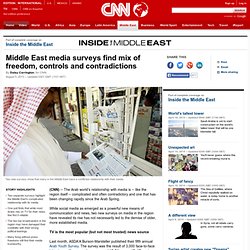
Two separate surveys highlight the Middle East's complicated relationship with its media.One poll finds that while most Arabs rely on TV for their news, few find it reliable.The two top broadcasters in the region may have damaged their credibility with their strong political leanings.Many living without press freedoms still find their media trustworthy. Syria overshadows G-20 summit as world leaders meet.
President Obama renewed efforts Thursday to persuade global allies to back a military strike on Syria over the use of chemical weapons, a strategy he is also pushing with members of Congress in the United States.
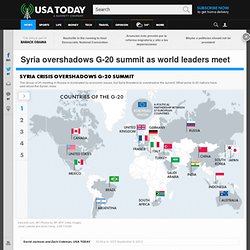
Attending a G-20 summit in Russia otherwise devoted to the global economy, Obama said before a meeting with Japanese Prime Minister Shinzo Abe that he looked forward to "an extensive conversation" about Syria. That includes "our joint recognition that the use of chemical weapons in Syria is not only a tragedy but also a violation of international law that must be addressed," Obama said. The White House said that Obama has also spoken with U.S. senators from both parties during his three-day trip to Sweden and Russia, seeking domestic support as Congress considers a resolution authorizing force against Bashar Assad's government. 5 Ways Social Media Spread Word of Syrian Chemical Attack. Photo Courtesy Associated Press As the Obama Administration weighs how and when to take action against a Syrian regime that reportedly used chemical weapons against its own people, YouTube, Twitter and even Reddit have played a key role in both breaking the news and keeping the world informed.
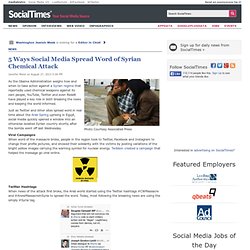
Just as Twitter and other sites spread word in real time about the Arab Spring uprising in Egypt, social media quickly opened a window into an otherwise isolated Syrian country shortly after the bombs went off last Wednesday. Viral Campaigns When word of the massacre broke, people in the region took to Twitter, Facebook and Instagram to change their profile pictures, and showed their solidarity with the victims by posting variations of the bright yellow images carrying the warning symbol for nuclear energy. Twibbon created a campaign that helped the message go viral online. This YouTube channel and another one here, started posting a stream of disturbing video images shortly after the bombs went off. Arab Media & Society. An Egyptian protester acknowledges the role of social media, picture by Awais Chaudhry Introduction “If you want to free a society, just give them Internet access.”
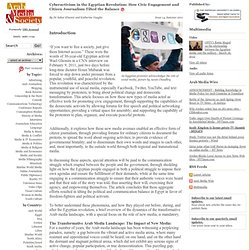
These were the words of 30-year-old Egyptian activist Wael Ghonim in a CNN interview on February 9, 2011, just two days before long-time dictator Hosni Mubarak was forced to step down under pressure from a popular, youthful, and peaceful revolution. This revolution was characterized by the instrumental use of social media, especially Facebook, Twitter, YouTube, and text messaging by protesters, to bring about political change and democratic transformation. Social media helping education in Arab world. Last Updated: Wednesday, June 26, 2013, 21:56 Dubai: The continued growth of social media in the Arab region has facilitated innovations by people, created new horizons for government entities and new social trends by Arab societies, says a new report.
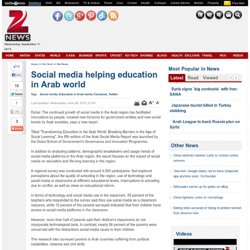
Titled "Transforming Education in the Arab World: Breaking Barriers in the Age of Social Learning", the fifth edition of the Arab Social Media Report was launched by the Dubai School of Government's Governance and Innovation Programme. In addition to analysing patterns, demographic breakdowns and usage trends of social media platforms in the Arab region, the report focuses on the impact of social media on education and life-long learning in the region. However, more than half of parents said their children's classrooms do not incorporate technological tools. cima.ned.org/sites/default/files/CIMA-Arab_Social_Media-Report%20-%2010-25-11.pdf. Social Media Use In The Arab World (Facebook Favored, LinkedIn Not So Much) A study performed by Northwestern University in Qatar provided some unique insights into the use of technology, media and social media use in the Arab world.
The comprehensive study was performed in early 2013 in an effort to better understand media in Qatar and to “provide a snapshot of media use in the Arab world.” Researchers gathered survey results from 10,000 respondents in Egypt, Tunisia, Bahrain, Qatar, Saudi Arabia, Jordan, Lebanon and the United Arab Emirates. The Impact of Social Media on the Democratisation Process in Arab Countries. Report on the workshop organised by Hivos at the first Arab Internet Governance Forum in Kuwait, October 2012 Moderator: Hanane Boujemi (Hivos), Internet Governance coordinator for the MENA region Speakers: ASMR_5_Report_Final.pdf - Nightly. www.arabsocialmediareport.com/UserManagement/PDF/ASMR%204%20updated%2029%2008%2012.pdf. [WARNING CONTENT] New Syria Chemical Gas Attack Videos. Islamist rebels in Syria reject National Coalition. 25 September 2013Last updated at 06:37 ET The statement was read out by the political leader of Liwa al-Tawhid Eleven Islamist rebel groups in Syria have announced they do not recognise the authority of the main opposition alliance, the National Coalition.
A joint statement says: "All groups formed abroad without having returned to the country do not represent us. " They also call for the opposition to unite under an "Islamic framework". How social media is changing the Arab world [Interview] Used with a CC-license. EMT announces availability of Secunia PSI in Arabic. How the Middle East uses social media, in four charts. Syria, citizen journalism and the capital “T,” truth. Syrians use social media to tell world: See atrocities for yourself. Editors' Picks: ‘Gay Jeans’ that fade into rainbow-colored denim created. The Role of Social Media in the Syrian Civil War. Syria's Civil War Plays Out On Social Media. BEIRUT -- BEIRUT (AP) — Amid all the bloodshed, confusion and deadlock of Syria's civil war, one fact is emerging after 2½ years — no conflict ever has been covered this way. Amateur videographers — anyone with a smartphone, Internet access and an eagerness to get a message out to the world — have driven the world's outlook on the war through YouTube, Twitter and other social media.
In northern Syria, rebels use satire as a weapon. The northern Syrian town of Kafr Nabl has gained fame for its satirical portrayal of the conflict. Rebels in northern Syrian town chide al-Assad with satirical posters, videosLeader says laughter shows world "we are human and we want to live"Latest video features civilians and Free Syria Army rebels dressed like cavemen (CNN) -- War and humor make strange bedfellows, but in the absurdity of Syria's nearly three-year civil war, one town has made laughter a form of resistance. From caricatures of Syrian President Bashar al-Assad with a skunk's body and chemical weapons smoking from his bottom to posters reading "Rebuilding houses takes some time, but humanizing ASSad can never happen" the northern town of Kafr Nabl has gained fame for its satirical portrayal of the conflict. "Laughter means life. Firas Al-Atraqchi: Middle East in 2011: Social Media to Take on Governments.
Jon Stewart IRAN Film-Making (Middle East) Saudi woman killed for chatting on Facebook. Online activists in the Middle East: Seeds of the future. View From Washington: Imprisoned Iranian Labor Activist Dead.